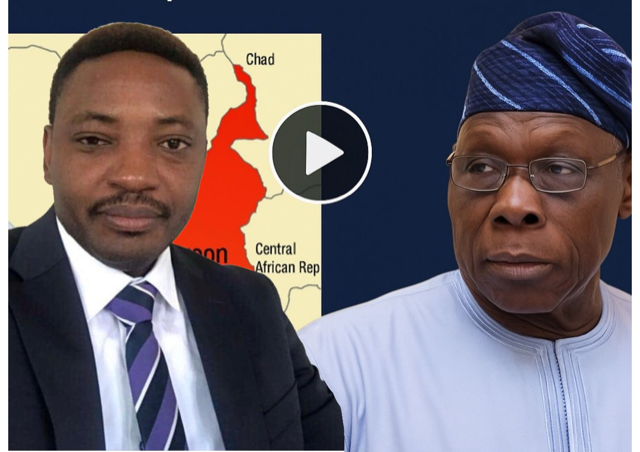
Is Obasanjo’s $700 Million Deal in Cameroon a Political Payback for Bakassi?
The Strategic Silencing of the Eastern Region and the Suppression of Indigenous Aspirations
The recent announcement of a $700 million investment in Cameroon by former Nigerian President Olusegun Obasanjo may appear, on the surface, as a boost to regional trade and cooperation.
But beneath the headlines lies a deeper narrative—one that speaks to elite loyalty, geopolitical insurance, and the suppression of indigenous rights.
To many across West and Central Africa, this investment looks like a political payback for the 2006 Bakassi handover, when Obasanjo surrendered Nigeria’s claim to the oil-rich peninsula in what many now consider a strategic betrayal of the former Eastern Region.
Bakassi: A Handshake Across the Fence
In 2006, through the Greentree Agreement, Obasanjo authorized the peaceful withdrawal of Nigerian forces from Bakassi, handing the territory to Cameroon following an International Court of Justice (ICJ) ruling.
Though legally sound, the decision was seen by many—especially among Efik and Eastern ethnic groups—as a violation of historical, cultural, and territorial rights. Communities were uprooted, marginalised, and rendered stateless.
The Investment: Reward or Coincidence?
Today, Obasanjo returns to Cameroon not as a negotiator, but as a businessman. Obasanjo is being granted access to prime economic sectors in Cameroon—agriculture, energy, maritime logistics, and hospitality—through his company Agro-Allied Business Ltd (OABL). this looks like a delayed payoff for past political services rendered.
This is what the Cameroon government has granted him access to.
• Agriculture, with over 610 hectares of land,
• Timber processing,
• Oil and gas terminals at the Kribi deep-sea port,
• Transshipment logistics, and
• A five-star hotel project.
Such strategic investment—granted in heavily regulated sectors—could only happen with the blessing of Cameroon’s political elite, raising concerns that this may be Paul Biya’s “thank you” for Obasanjo’s earlier concessions.
The people in Nigeria and Cameroon have to see , this deal as more than just economics—it’s a strategic reward for Obasanjo’s role in transferring the Bakassi Peninsula to Cameroon in 2006.
But more disturbingly, it may signal a consolidated effort between Cameroonian and Nigerian elites to permanently marginalize the indigenous peoples of the former Eastern Region, including Biafrans (Igbo) and Southern Cameroonians (Ambazonians). Ambazonia and Biafra struggle is One Struggle, Divided by Borders . It’s the former Eastern Bloc which was once the cradle of west Africa educational and civilisation pride now being relegated.
Elite Alliances based on the Exclusion of the “ East”
Obasanjo’s influence over the People’s Democratic Party (PDP) has shaped a pattern of Eastern political exclusion:
Obasanjo championed The denial of presidential zoning to the Southeast in 2023 and before,
• The systematic undermining of Igbo presidential aspirants like Alex Ekwueme, Peter Obi, and others,
• The failure to implement the 2014 National Conference recommendations, which included regional autonomy and restructuring,
• Using the party apparatus to marginalize Eastern voices.
• And the militarization of the Southeast, especially since the rise of IPOB, used as justification to suppress civil rights.
Eastern leaders are either forced into political irrelevance or absorbed into elite networks where they cannot advocate openly for indigenous concerns.
Similarly, in Cameroon, the French-backed ruling elite has systematically denied Anglophones access to the presidency, despite decades of demands for fair representation. For over 60 years, no Anglophone has ever led the country.
The region’s people—who once voted willingly to join a union with Francophone Cameroon—have been relegated to second-class status.
Cameroon’s Francophone Domination: A System Built on Suppression
In Cameroon, the Anglophone community has been systemically excluded from power:
• No Anglophone president since reunification in 1961,
• Marginalization in military leadership, judiciary, education, and civil service,
• Violent suppression of peaceful protests in 2016–2017, leading to the ongoing armed conflict in Southern Cameroons,
• Rigged appointments and co-opted Anglophone elites who act as loyalists instead of advocates.
Even prominent figures like Ni John Fru Ndi and Philemon Yang, despite decades of service, were never seriously considered for the presidency, kept in symbolic roles to create a façade of inclusion.
Meanwhile, Francophone oligarchs, deeply entrenched and often supported by French business and intelligence interests, control the state’s direction and resources.
Yet, as history has shown in other multicultural nations, an Anglophone presidency could serve as a unifying breakthrough—an act of reconciliation and reform. Anglophone leadership could offer Cameroon a new developmental vision rooted in bilingualism, equity, and federal inclusion.
The Cost of Silencing the “East”
This pattern of elite suppression is not just a political problem—it has real consequences:
1. Human Rights Violations: Thousands of lives lost in Southeast Nigeria and Southern Cameroons due to state-sanctioned violence.
2. Economic Sabotage: Eastern regions rich in human capital and resources remain underdeveloped due to political punishment.
3. Security Instability: Rising militancy, displacement, and cross-border tensions are direct results of unresolved political grievances.
4. Diminished National Unity: By excluding entire regions from power, both Nigeria and Cameroon weaken the fabric of their own unity.
The Missed Opportunity: Anglophone Leadership as a Path to National Renewal
In both nations, an Eastern or Anglophone presidency could be a powerful symbol of reconciliation and national healing:
• In Nigeria, it would acknowledge the Igbo’s resilience since the Biafra War and correct historical exclusion.
• In Cameroon, it would honor the 1961 reunification pledge and bring justice to decades of Anglophone marginalization.
Instead, French-backed ruling elites in Cameroon, and their northern and western counterparts in Nigeria, continue to operate in fear of indigenous empowerment, seeing it as a threat rather than an opportunity.
A Just, Peaceful, and Inclusive Future
The People’s Rights Advocacy Platform (PRAP) believes that violence and suppression are not solutions to indigenous aspirations. Instead, we call for a nonviolent, rights-based approach to national inclusion—rooted in:
• Respect for indigenous identity,
• Equitable federal structures,
• Cultural autonomy, and
• Economic empowerment.
We urge Nigeria and Cameroon to adopt lessons from:
• Canada’s model of recognizing Quebec’s uniqueness,
• Spain’s decentralization to the Basque and Catalan regions, and
• South Africa’s reconciliation frameworks post-apartheid.
A thriving Eastern Region—where Biafrans and Ambazonians are respected, included, and empowered—can become Africa’s next economic and democratic miracle. But that can only happen when political manipulation ends and truth is embraced.
Let us choose justice over geopolitics, rights over repression, and peace over payoffs.
Time for a Strategic Rethink: Reclaiming the Political Consciousness of the Eastern People
In a season where political power is traded like currency and regional interests are exchanged in backroom deals, the people of Southern Cameroons and Eastern Nigeria—the so-called Eastern People—must confront a hard truth: those who trade us politically are winning.
And they are succeeding not necessarily because they are stronger, but because we have lost consciousness of the geopolitical chessboard on which our lives are being played.
For too long, we have allowed ourselves to be fragmented—between tribes, between states, and across colonial borders. We have become too reactive, responding to injustices only after they have been cemented in law and policy.
Meanwhile, the architects of our marginalization are proactive—financing radicalism when it suits them, sabotaging unity when it threatens their influence, and exploiting our secessionist sentiments to make us appear illegitimate on the national and international stage.
This must end.
The Radical Trap: Who Benefits?
The rise of armed groups and radical rhetoric in both Southern Cameroons and the Southeast of Nigeria has given outside actors and internal enemies the perfect excuse to brand our peoples as threats, not stakeholders.
But let us ask: who truly benefits from this instability?
It is not the displaced villagers in Bamenda and Akwaya or Orlu.
It is not the young anglophone graduates denied jobs due to security concerns in their regions.
It is not the families living under military occupation or in refugee camps.
The true beneficiaries are those who exploit our pain for political deals, who trade our silence for economic access, and who use our disunity to isolate us from national relevance.
The Political Platform is Still Ours—If We Seize It
We must not let the exposure of backdoor political payoffs and shady investments—such as Obasanjo’s $700 million venture in Cameroon—become the end goal. Exposing betrayal is not enough. We must bargain for something better.
And to do that, we must:
Re-enter the political platform, not as outsiders begging for recognition, but as strategic players with demands rooted in justice, representation, and inclusion.
Engage with goodwill where it exists, and build alliances where they don’t.
Shift from secessionist instinct to systemic engagement, not by surrendering our identity, but by leveraging it to demand fairness in power-sharing, economic equity, and regional development.
We Cannot Return to Enugu, But We Can Build Forward
It is time we accept a reality we have long resisted: we cannot return to the political glory of Eastern Nigeria headquartered in Enugu.
That chapter has passed. But what must not pass is our right to exist with dignity and leadership in the modern configurations of Nigeria and Cameroon.
We must not allow ourselves to be defined as “outsiders needing to be absorbed.” That is the language of erasure. We are co-founders of the modern states of Nigeria and Cameroon, and any political future that does not reflect this history is illegitimate.
To the new generation: understand this—you were born into a different battlefield. The old wars of secession, as noble as they were in cause, can no longer guide us blindly. We need a deliberate strategy that speaks the language of this era: coalition building, policy influence, economic strength, digital advocacy, and long-term generational planning.
The Risk of Indifference: Bystanders in Our Own Story
If we are not deliberate, we will become spectators in our own story—watching others define our fate, write our history, and own our resources. The risk is not just marginalization. It is irrelevance.
Let this be our wake-up call.
Let us move beyond being divided dreamers of lost nations, and become united architects of a new political and cultural renaissance—rooted not in nostalgia, but in vision.
Let us stop being traded, and start setting the terms.
Capo Daniel
People’s Rights Advocacy Platform (PRAP) regards

